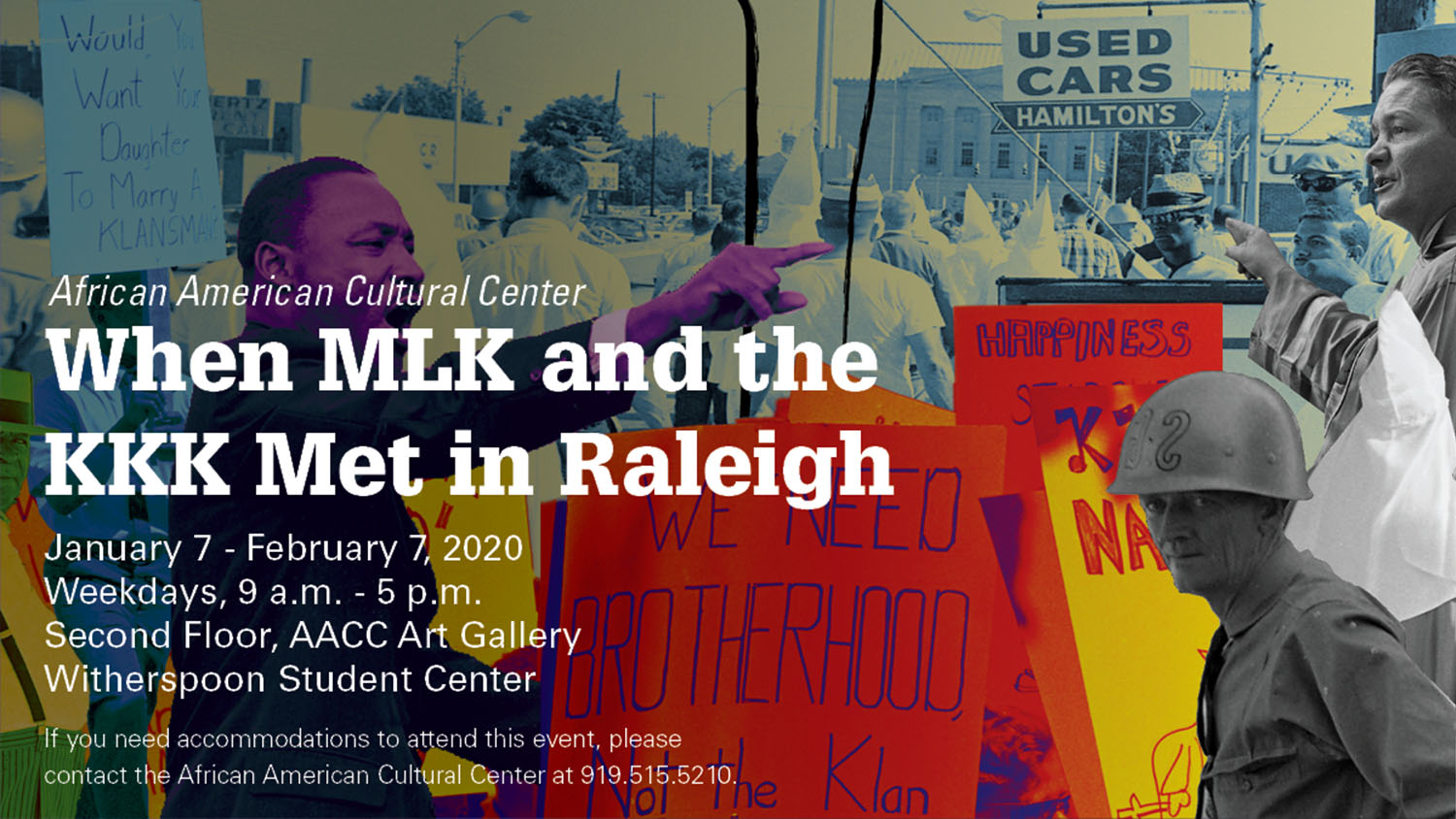When MLK and the KKK met in Raleigh

Curator Statement
This gallery focuses on the day that MLK and the KKK met in Raleigh, North Carolina – yet we can also see two purposeful paths by our state’s citizens: the KKK’s walk-in protest of Dr. King, and the people’s protest of the Klan. In the gallery, you will be directed to walk a new path that explores these two journeys. In doing so, hopefully, we can learn more about the brutal and real history of the Tar Heel state, while also gaining consciousness of the footprints that we leave behind us, as well as those that we choose to follow.
-Kelsey Virginia Dufresne, Exhibit CuratorResearcher’s Statement II
This gallery focuses on the day that MLK and the KKK met in Raleigh, North Carolina – yet we can also see two purposeful paths by our state’s citizens: the KKK’s walk-in protest of Dr. King, and the people’s protest of the Klan. In the gallery, you will be directed to walk a new path that explores these two journeys. In doing so, hopefully, we can learn more about the brutal and real history of the Tar Heel state, while also gaining consciousness of the footprints that we leave behind us, as well as those that we choose to follow.
-Kelsey Virginia Dufresne, Exhibit CuratorResearcher’s Statement II
Over the last three years of research, everyone has asked me (in one way or another) How has Dr. King’s visit to our campus been lost? The exhibit itself answers that question in one way— that the conditions surrounding his visit forces us to confront the stories we don’t like to tell about ourselves. Stories where we’re victims. Stories where evil places its homeland in America itself— rather than beyond its borders. These silenced stories are suggestive of a hidden pain. As others have said, perhaps the earliest pain we feel comes from the first time we had a chance to speak but didn’t. In merely looking, we hope to do more than see. In fact, one of the first metaphors many of us every heard about walking in another person’s shoes is also one of the hardest to learn. Share what you’ve felt here: #MLKvKKKinRaleigh
Dr. King’s visit to NC State on July 31, 1966 is also a story of the archive. Because the vast majority of Raleigh’s citizens opposed his politics and failed to welcome him, documenting Dr. King’s presence was difficult from the beginning. It is as much a result of the era’s dismissive views (much more than time or technological challenges) which has left the archive a stunning void when it comes to researching the speech Dr. King delivered on this campus. That present void is a critical part of this story, and this exhibit marks the first step in building an archive for all members of the NC State Community (past, present and future). I would like to thank the African American Cultural Center, the State Archives of North Carolina, the Department of English, and the NC State Libraries for making that a reality. Archives teach, critique, and empower through the materiality of artifacts. In this way, they put the past at hands length.
In addition to stories and archives, a third consideration must also be addressed by every researcher: What is truth? Is it essential to now know that Langston Hughes was actually born in 1901 (not 1902 as everyone always believed)? Does confirming that Chief Joseph led the Nez Perce across the Snake River in 1877 explain why the Calvary was chasing him? When we establish dates such as 1877 or 1901, aren’t we merely establishing accuracy and correctness?
What truth emerges when we see through different lenses? We can see a puffin waddle with our everyday eyes while binoculars can reveal two billing each other outside their den. Only a photographic lens can illuminate the three claws they have on each of their feet. But these are lessons in point of view that teach us about more about perspective than truth. At their best, they create meaning through interpretation.
Paradigms filter truth by choosing their evidence beforehand. Fox News and CNN, faith and nihilism,
capitalism and communism confirm what Wallace Stegner said about the dangers of not letting new things in: Like wet rawhide, paradigms strangle what they hold once they dry.
Or, is Truth an uncovering—a lift of the cloche to reveal what’s hidden? As one philosopher has said (through translation), Truth is an unconcealment. If Truth results in change, then lies live and die, and only Truth is immortal. The best research is infused with this belief: Truth is a secret that gets repeated. Pass it on.
Dr. W. Jason Miller
Professor
Department of English
Scholar-in-Residence / African American Cultural Center (2019-20)
NC State University
Learn More about MLKvKKK
- NC State’s Audio Abstract Podcast
- Technician: NC State African American Cultural Center exhibits unseen Martin Luther King Jr. photos
- Landmark Exhibit Unearths History
- First in Future: NC State Professor Jason Miller (Institute for Emerging Issues)
- Part I, Dr. Martin Luther King Jr.
- Part II, Dr. Martin Luther King Jr.